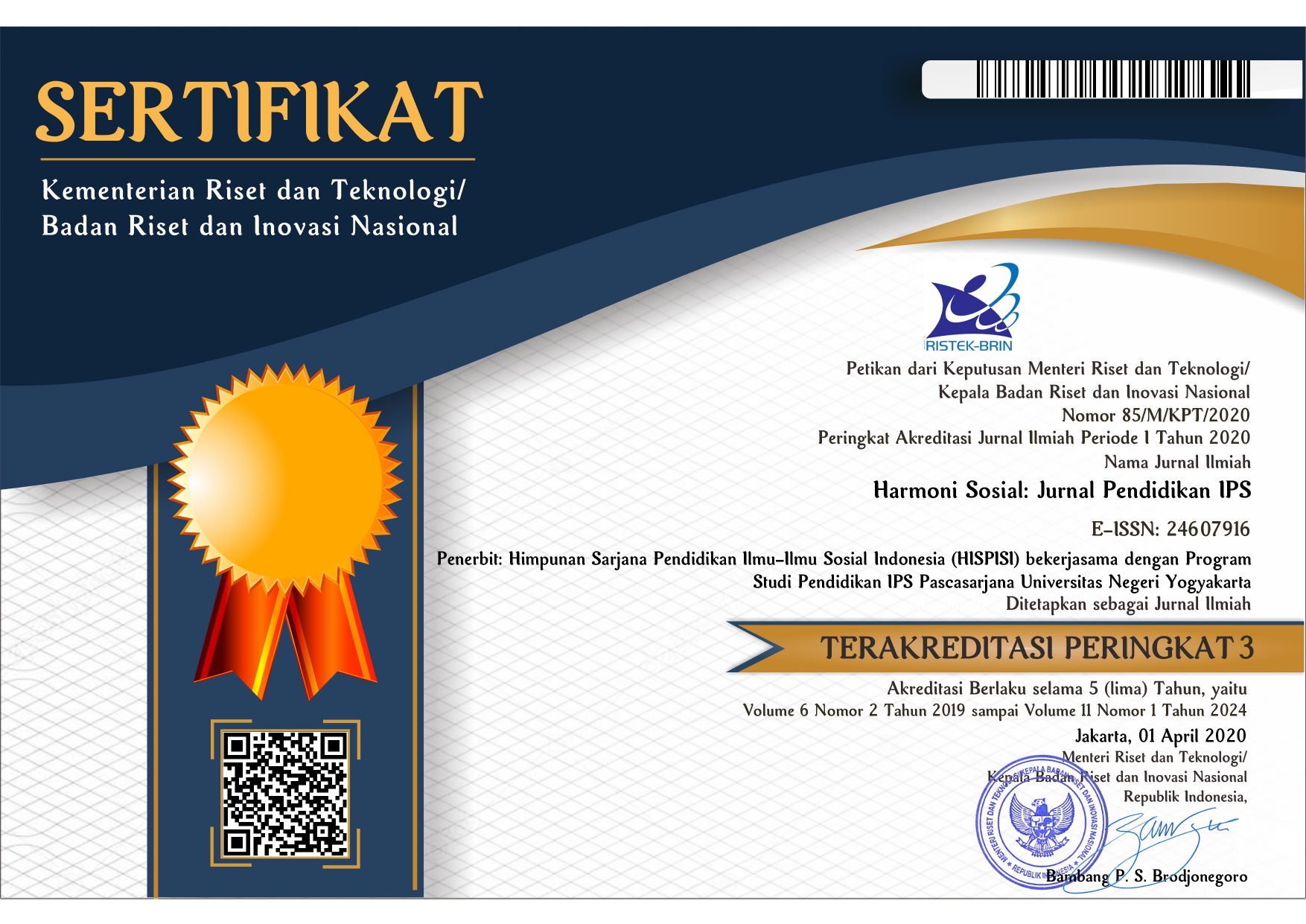Keefektifan implementasi pendekatan saintifik dengan metode inkuiri dan problem-based learning ditinjau dari minat siswa
Diah Respati Suryo Sumunar, , Indonesia
Abstract
Penelitian ini bertujuan untuk mengungkapkan kefektifan implementasi pendekatan saintifik dengan metode inkuiri dan problem-based learning ditinjau dari minat siswa terhadap hasil belajar geografi kelas X SMA Negeri di Kabupaten Ngada. Metode penelitian yang digunakan adalah eksperimen. Penelitian dilaksanakan pada dua kelompok. Kelompok eksperimen 1 adalah kelompok sampel yang menggunakan metode inkuiri, kelompok eksperimen 2 adalah kelompok sampel yang menggunakan metode problem-based learning. Pengambilan sampel dilakukan dengan teknik cluster sampling. Analisis data menggunakan analisis deskriptif dan inferensial analisis varian (anava). Simpulan penelitian ini adalah, (1) Tidak terdapat perbedaan yang signifikan dari pembelajaran metode inkuiri dan metode problem- based learning terhadap hasil belajar geografi. (2) Tidak terdapat perbedaan yang signifikan dari tingkat minat belajar siswa terhadap hasil belajar geografi; (3) Pada masing-masing metode pembelajaran tidak terdapat perbedaan dari tingkat minat belajar terhadap hasil belajar geografi. (4) Pada masing-masing kategori, tidak ada perbedaan minat belajar dengan metode pembelajaran terhadap hasil belajar geografi.
Kata kunci: inkuiri, problem-based learning, minat siswa
THE EFFECTIVENESS OF THE IMPLEMENTATION OF THE SCIENTIFIC APPROACH WITH THE INQUIRY METHOD OF LEARNING AND THE PROBLEM-BASED LEARNING IN TERMS OF THE STUDENTS’ INTEREST
Abstract
This study aims to reveal the effectiveness of the implementation of scientific approaches with inquiry methods and problem-based learning in terms of student interest in the results of geography class X SMA Negeri Ngada. The study employed the experimental method. It involved two groups, namely experimental group 1 and experimental group 2. Experimental group 1 was the sample group learning through the inquiry method, while experimental group 2 was the one learning through the problem-based learning method. Two classes were selected as the sample, namely experimental group 1 and experimental group 2. The sample was established by means of the cluster sampling technique. The data were primary data collected through questionnaires and learning achievement tests. The data analysis techniques were the descriptive analysis and the inferential analysis of variance (ANOVA). The conclusions of the study are as follows. (1) There is no significant difference between the learning through the inquiry method and that through the problem-based learning in terms of the geography learning achievement. (2) There is no significant difference in the students’ learning interest level in terms of the geography learning achievement. (3) In each learning method, there is no significant difference in the learning interest level in terms of the geography learning achievement. (4) In each learning interest category, there is no difference in the learning methods in terms of the geography learning achievement.
Keywords: inquiry learning, problem-based learning, students’ interestKeywords
Full Text:
Fulltext PDFDOI: https://doi.org/10.21831/hsjpi.v4i1.11040
Refbacks
- There are currently no refbacks.
Copyright (c) 2017 Harmoni Sosial: Jurnal Pendidikan IPS

This work is licensed under a Creative Commons Attribution-ShareAlike 4.0 International License.
Our journal indexed by:
Printed ISSN (p-ISSN): 2356-1807 | Online ISSN (e-ISSN): 2460-7916
 This work is licensed under a Creative Commons Attribution-ShareAlike 4.0
This work is licensed under a Creative Commons Attribution-ShareAlike 4.0


















